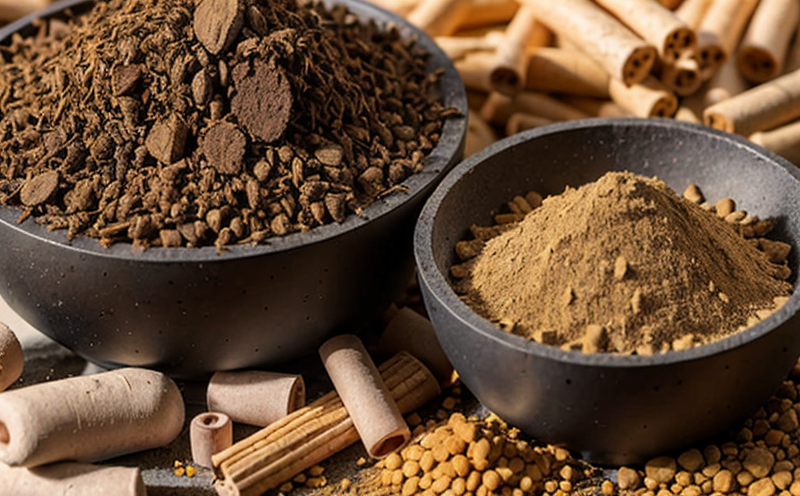EN 16127 Strength Testing of Biomass Briquettes
The EN 16127 standard specifies the method for determining the crush resistance (compression strength) of biomass briquettes. This testing is crucial for ensuring that bioenergy resources meet quality and performance criteria, thereby enhancing their reliability and efficiency in energy production processes.
Biomass briquetting involves compressing biomass into compact blocks to facilitate easier handling, storage, and transportation. The strength of these briquettes is a key determinant of their suitability as a fuel source for biomass power plants and other industrial applications. Compliance with EN 16127 ensures that the briquettes are robust enough to withstand the rigors of transport and processing without losing structural integrity.
The crushing test, according to EN 16127, involves applying progressively increasing pressure until a specified percentage (typically 50%) of compression is achieved. This method provides an accurate measure of the briquette's resistance to compression forces under controlled conditions.
For effective testing, specimens must be prepared following strict guidelines outlined in the standard. Specimens should ideally be cylindrical or cubical in shape with a diameter ranging from 25 mm to 40 mm and height between 30 mm and 60 mm. The density of these specimens is crucial as it directly influences their crush resistance.
The testing equipment used must comply with the requirements specified in EN 16127, which includes a hydraulic press capable of applying controlled loads up to at least 50 kN (kiloNewtons). Ensuring that the press can apply load consistently and accurately is paramount for reliable test results.
The procedure involves placing the specimen on the lower plate of the press, ensuring it is centered. A cylindrical plunger is then placed over the top surface of the specimen, also centered. The crushing force is gradually increased until 50% crush resistance (compression strength) is achieved or until a specified maximum load limit is reached, whichever comes first.
The results obtained from this test are essential for several reasons:
- They provide critical data on the mechanical properties of biomass briquettes,
- They help in optimizing production processes by identifying optimal compaction pressures and binder concentrations,
- They ensure compliance with international standards, thereby facilitating trade between countries.
The standard also specifies acceptance criteria for crush resistance. A specimen is considered to have passed the test if it achieves a minimum specified crush resistance value under defined conditions. Failure to meet these criteria can indicate issues in the production process or raw material quality.
Testing according to EN 16127 not only ensures that biomass briquettes are robust enough for their intended use but also helps in maintaining consistent quality across different batches and suppliers. This is particularly important in the context of sustainable bioenergy practices, where high-quality fuel sources contribute significantly to reducing carbon emissions.
Applied Standards
The EN 16127 standard is widely recognized for its robustness and reliability in assessing the crush resistance of biomass briquettes. It aligns with international best practices, ensuring that tests are conducted under consistent conditions worldwide.
| Standard | Description |
|---|---|
| EN 16127-3:2014 | Determination of crush resistance (compression strength) of biomass briquettes. |
| ISO 19582:2015 | Guidelines for sustainability indicators in the bioenergy sector. |
| ASTM D7443-16 | Standard test method for determining the crushing strength of wood pellets. |
The integration of these standards ensures that testing methodologies are harmonized across different industries and regions, fostering a collaborative approach to bioenergy development.
Environmental and Sustainability Contributions
Biomass briquettes play a pivotal role in the transition towards sustainable energy sources. By ensuring that these briquettes meet stringent quality criteria through EN 16127 testing, we contribute to reducing reliance on fossil fuels and mitigate environmental impact.
The use of biomass as an energy source is inherently renewable, provided it is sourced sustainably. Crush resistance testing ensures that the fuel used in bioenergy production meets high standards of durability, which translates into more efficient combustion processes. This efficiency leads to reduced emissions during energy conversion, thereby supporting global efforts towards combating climate change.
Biomass briquettes also offer an advantage over loose biomass materials by reducing losses during handling and transportation. This compact form of fuel increases the overall efficiency of bioenergy systems, leading to better resource utilization and lower operational costs.
Moreover, the use of standardized testing methods like EN 16127 ensures that the quality of biomass briquettes is consistent across suppliers. This consistency is crucial for ensuring reliable performance in energy production processes, ultimately contributing to the reliability and sustainability of bioenergy systems worldwide.
Use Cases and Application Examples
- Bioenergy Power Plants: Ensuring that briquettes are robust enough to withstand the high-pressure environment within power plants is critical for efficient operation. Crush resistance testing, as per EN 16127, helps in optimizing fuel feed systems and reducing maintenance costs.
- Biomass Pellet Producers: Compliance with this standard ensures that producers deliver a consistent product quality to their clients, enhancing customer satisfaction and brand reputation.
- R&D Engineers: The test results from EN 16127 provide valuable insights into the relationship between compaction parameters and briquette strength. This knowledge aids in developing advanced production techniques aimed at improving fuel efficiency and reducing waste.
| Use Case | Description |
|---|---|
| Bioenergy Power Plants | Optimizing fuel feed systems to ensure efficient combustion and reduce maintenance costs. |
| Biomass Pellet Producers | Ensuring consistent product quality and enhancing customer satisfaction. |
| R&D Engineers | Determining the relationship between compaction parameters and briquette strength to develop advanced production techniques. |
The application of EN 16127 in these sectors underscores its significance in promoting sustainable bioenergy practices. By ensuring that biomass briquettes meet stringent quality criteria, we contribute to a more efficient and environmentally responsible energy sector.





